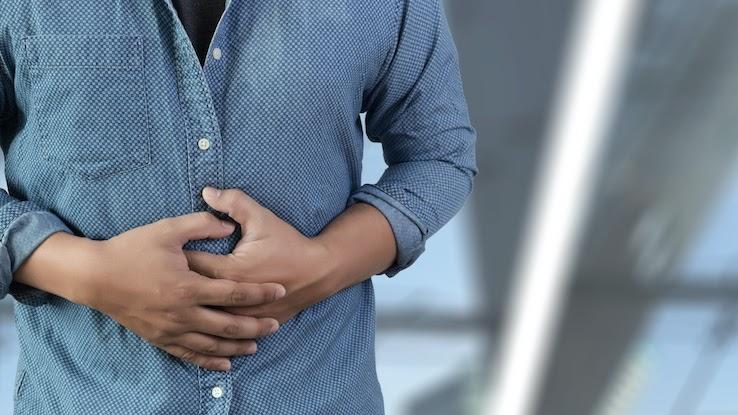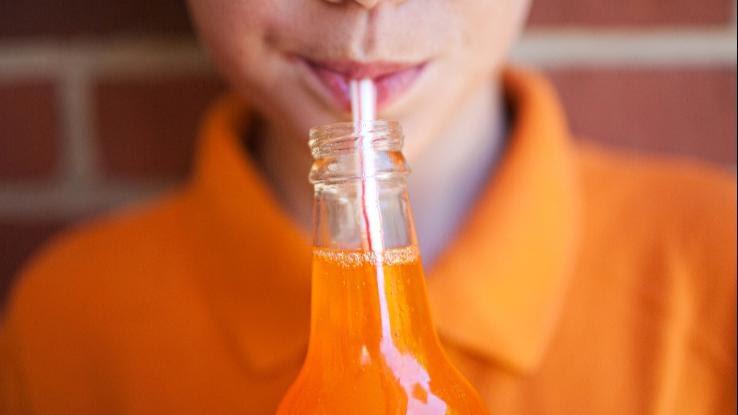Something That Stops Something From Happening Again

Merely about anybody has experienced hiccups at ane fourth dimension or another. They're most mutual in infants, but everything from drinking bubbly sodas to chowing down on spicy foods to swallowing air too quickly tin atomic number 82 to those telltale spasms in people of all ages.
As common as hiccups are, they're not a health issue in and of themselves (though they can be a symptom of underlying conditions). They are, though, a nuisance — and sometimes a puzzle. So simply what are hiccups, and what causes them? And, most importantly, how tin you lot stop them in their tracks to go along them from interfering with your daily life? Learn the answers to these (and other) questions below.
What Are Hiccups?

Hiccups start in your diaphragm, which is a apartment, plate-shaped muscle that separates your breast from your abdominal crenel (and your lungs from your tummy). It's involved in breathing; when your diaphragm rises, air is forced from your lungs, causing you to exhale. When the muscle lowers, your lungs pull air in as you inhale.
Every once in a while, and for reasons that aren't well understood, your brain sends a signal through the nerves ending in your diaphragm. This signal triggers your diaphragm to drib of a sudden. When that happens, the movement pulls air through your mouth and into the back of your throat. The combination of all these signals and musculus contractions causes a pressure change that apace closes your vocal cords and results in the telltale "hic" audio.
Hiccups usually don't concluding longer than a few minutes, but in some cases they tin persist for longer periods of time. According to the Mayo Clinic, hiccups that last longer than 48 hours are ofttimes a symptom of an underlying medical condition or the outcome of exposure to an irritant or certain medication.
What Causes Hiccups?

While hiccups are sometimes a symptom of another health concern, they often develop on their ain due to certain triggers. Some of the most common causes of hiccups that unremarkably won't last longer than 48 hours include the post-obit:
- Drinking carbonated drinks, such equally sodas or beer
- Overeating, which results in force per unit area from a very total stomach
- Drinking large amounts of alcohol
- Inhaling too much air, such as while smoking, chewing gum, drinking through a straw or sucking on difficult candies
- Experiencing sudden temperature changes
- Experiencing excitement, stress or other intense emotions
When hiccups are the result of an underlying medical condition, they may last longer than 48 hours or you may brainstorm to experience much more than frequent bouts of them. Sometimes, they happen when your vagus or phrenic fretfulness, which interact with your diaphragm, go triggered. Below are some of the most mutual medical reasons people feel hiccups:
- Irritation or damage to the vagus and phrenic fretfulness caused by factors such as tumors or cysts in your neck, something touching your eardrum, laryngitis or severe indigestion
- The apply of barbiturate, steroid or tranquilizer drugs
- Metabolic disorders such equally kidney illness or diabetes
- Health conditions such as alcoholism
- Undergoing anesthesia
- Disorders involving your central nervous system, which may include strokes, multiple sclerosis, brain injuries or infections
How Can You lot Terminate Hiccups?

There isn't ane surefire manner to eliminate hiccups. If they're the result of a medical condition, treating that underlying issue can bring an end to your hiccups. Similarly, you lot might need to terminate taking medications that cause hiccups to find relief. However, if a glass of soda or a bite of spicy nutrient is what sets off a bout of these spasms, identifying an effective remedy to stop your hiccups involves combining science, dwelling house remedies and an old wives' tale or two. While these options aren't guaranteed to finish hiccups for expert, people oftentimes experience success trying out the following techniques.
Belongings your breath and breathing into and out of a paper pocketbook. Both holding your breath (for 10 to 20 seconds and repeating equally required) and animate into and out of a paper bag (to inflate and deflate the bag) increase the amount of carbon dioxide in your lungs. That carbon dioxide may relax your diaphragm musculus and end your hiccups. Keep in listen that you should never use a plastic purse.
Practicing breath control. Beyond holding your jiff, decision-making your breath to disrupt your respiratory system might help eliminate hiccups. Endeavour to breathe slowly, consistently and deeply past counting to five while inhaling and counting to five once again while exhaling.
Using the Valsalva maneuver. If you lot've ever tried to "pop" your ears while swimming or flying or when you're feeling congested, you'll likely exist familiar with this technique. To perform it, shut your oral cavity, pinching your nose shut and exhaling forcefully. The Valsalva maneuver tin can interrupt the reflexive spasms characteristic of hiccups. Endeavour holding this maneuver for about ten seconds, just keep in mind that, if information technology doesn't provide relief, yous don't want to continue repeating it.
Stimulating the dorsum of your throat. By gently pulling on your natural language or poking the back of your throat with a cotton wool swab, y'all tin can stimulate your vagus nervus — and perhaps even trigger your gag reflex. That gag reflex or the stimulation of your vagus nerve may be enough to stop your hiccups.
Drinking h2o. While some tips related to hiccups and water might autumn into "erstwhile wives' tale" territory, some simple sipping may really do the trick. Drink ice-cold water slowly to stimulate the vagus nerve. Like the Valsalva maneuver, repeatedly swallowing small amounts of water may also work to interrupt your hiccup reflex.
Trying pharmaceutical interventions. If these home remedies aren't constructive to eliminate your hiccups, your family doctor may be able to provide some relief in the form of prescription medication. If your hiccups terminal longer than 48 hours or if they're severe enough to interfere with your breathing, sleeping or eating, make an engagement with your doctor.
Resource Links:
https://world wide web.mayoclinic.org/diseases-conditions/hiccups/symptoms-causes/syc-20352613
https://www.nhlbi.nih.gov/health-topics/how-lungs-work
https://www.health.harvard.edu/diseases-and-weather condition/what-causes-hiccups
https://www.mayoclinic.org/diseases-weather condition/hiccups/multimedia/hiccups-what-causes-them/img-20008532
https://health.clevelandclinic.org/why-do-you-go-hiccups-and-how-to-stop-them/
https://pubmed.ncbi.nlm.nih.gov/25055206/
https://www.ncbi.nlm.nih.gov/pmc/manufactures/PMC5072913/
Source: https://www.symptomfind.com/healthy-living/stop-hiccups-immediately?utm_content=params%3Ao%3D740013%26ad%3DdirN%26qo%3DserpIndex
0 Response to "Something That Stops Something From Happening Again"
Post a Comment